As rain drizzled down on an early Saturday morning at Florence Fang Community Garden (FFCF),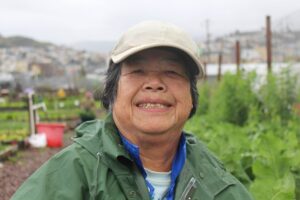 Ms. Chang finished loading up her cart with groceries and beckoned us over to view her most recent crop: a bountiful patch of cauliflower! Each plant boasted a still-growing cauliflower head, already larger than an outstretched hand.
Ms. Chang finished loading up her cart with groceries and beckoned us over to view her most recent crop: a bountiful patch of cauliflower! Each plant boasted a still-growing cauliflower head, already larger than an outstretched hand.
Ms. Chang is an eight-year volunteer and five-year food pantry participant at FFCF, a Food Bank partner and beautiful one-acre community center located in Bayview-Hunters Point. “It’s a really diverse space, with all kinds of people,” Ms. Chang told us. “I live in Hunters Point, so I walk here. My motivation to come out was that I’m retired, and now I have free time! This is an opportunity to find some joy, and it’s just really fun to socialize.”
Return of the Food Pantry
It’s not only social hour at the farm: Ms. Chang, along with around 15-20% of other farm volunteers, stops by FFCF’s Saturday morning food pantry before beginning her farm workday. Though it was forced 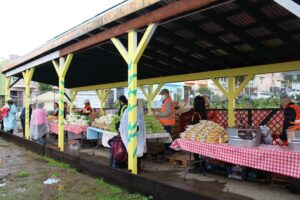 to close because of pandemic precautions, the pantry reopened with the support of the Food Bank back in February of 2023.
to close because of pandemic precautions, the pantry reopened with the support of the Food Bank back in February of 2023.
Now, FFCF provides pantry essentials and fresh produce each week to mainly Chinese elders. It’s a much-needed service, especially as high prices persist and safety net programs are rolled back – because neighbors like Ms. Chang and her eldest daughter, whom she lives with, are already feeling the impacts.
Ms. Chang shared her experience: “I have CalFresh, it helps me with getting groceries. It was definitely easier during the pandemic with their extra funding [emergency allotments]. But it barely holds me over now. I cope by just not buying as much – I have retirement (SSI) too, so I’m not completely depleted. It does feel like not enough sometimes, though.”
Saturday (Farm)er’s Market
Neighborhood pantries like FFCF help fill the gap with fresh, healthy food for thousands of neighbors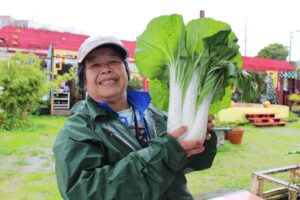 across San Francisco and Marin who are facing similar difficulties. On the Saturday we visited, volunteers laid out items like rice, bok choy, beets, carrots and celery farmer’s market-style, so each participant could take or decline items as they wished.
across San Francisco and Marin who are facing similar difficulties. On the Saturday we visited, volunteers laid out items like rice, bok choy, beets, carrots and celery farmer’s market-style, so each participant could take or decline items as they wished.
“It’s great to see all of the offerings and get to choose what I want to bring home. I tend to like everything, though,” Ms. Chang told us. “With today’s offerings, I’d throw together the carrots, celery, bok choy, throw some sort of meat in and make a lovely soup. It is great for bringing down inflammation in the body!”
A Joyful Space
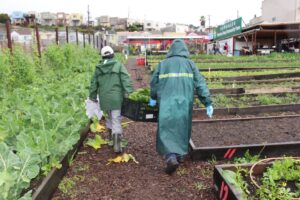 Upon immigrating to San Francisco from Guangzhou, China in the 80s, Ms. Chang worked as a sewist in San Francisco Chinatown’s garment factories. Now retired, the farm offers a different, more enjoyable kind of work: “I get to do some work on the farm, grow green vegetables and romaine lettuce. I grow really big winter melons. It isn’t too strenuous, and we get to pick whatever jobs we want. Plus, I like the exercise!”
Upon immigrating to San Francisco from Guangzhou, China in the 80s, Ms. Chang worked as a sewist in San Francisco Chinatown’s garment factories. Now retired, the farm offers a different, more enjoyable kind of work: “I get to do some work on the farm, grow green vegetables and romaine lettuce. I grow really big winter melons. It isn’t too strenuous, and we get to pick whatever jobs we want. Plus, I like the exercise!”
As we talk, she helps another volunteer carry a basket of recent harvests up the hill, where they’ll be divided among the volunteers – “we all get to share our harvests with one another,” explained Ms. Chang. That’s not all they share, because food and fun go hand in hand at FFCF. Typically, Ms. Chang will volunteer with her two younger sisters, but her daughter and grandchildren also stop by occasionally: “There’s a lot of events and activities at the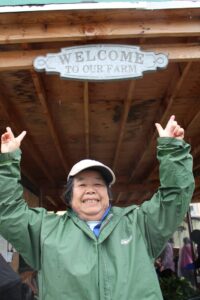 farm, and my family enjoys coming to these events. We throw parties, sing, dance, everything. You’ll have to come visit us when we put on talent shows!”
farm, and my family enjoys coming to these events. We throw parties, sing, dance, everything. You’ll have to come visit us when we put on talent shows!”
After marveling at the beauty and vibrancy of the farm and learning what Ms. Chang is planting for spring (tong ho and yao choy!), we finally wave goodbye. The rain has stopped, the sun is beginning to peek out, and Ms. Chang heads back to her fellow volunteers. From the smile on her face, it’s safe to say that FFCF has built not only a flourishing farm or food pantry, but a true community on this plot of land.
As Ms. Chang put it so succinctly: “I have a lot of friends here. Being here makes me happy.”


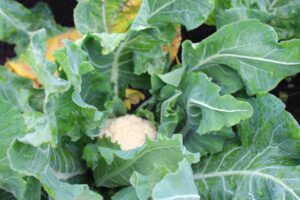
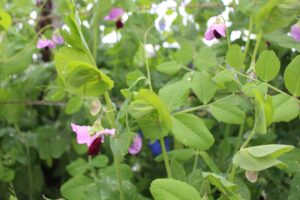

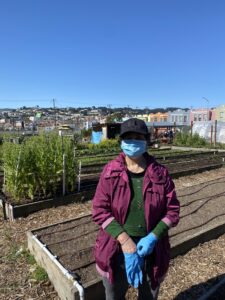
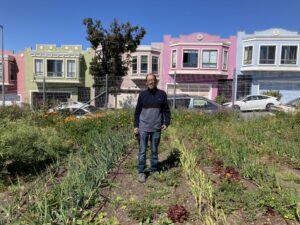 her history of civic contribution.
her history of civic contribution. 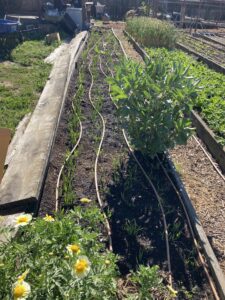 app] to stay in touch after leaving the farm.
app] to stay in touch after leaving the farm.
Share